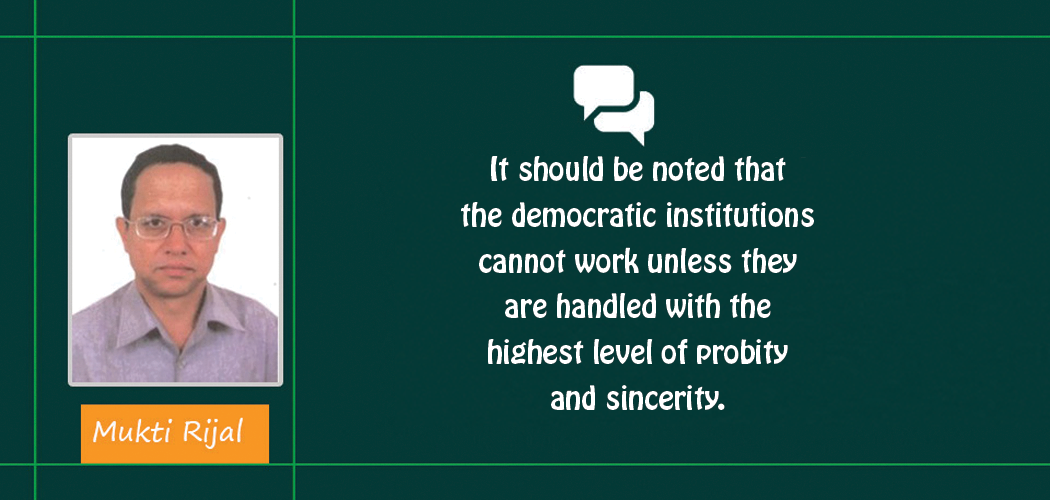- Thursday, 26 February 2026
On Presidential Democracy
Mukti Rijal
Prof. Surya Prasad Subedi reiterated his preference to the presidential democracy over the parliamentary one which is currently adopted and instituted by the Constitution of Nepal, 2015. At a lecture given at the meeting hall of the Policy Research Institute (PRI) where the Institute's fellow colleagues and policy researchers had attended and listened with rapt attention. Professor Subedi, the famed London-based scholar of international law, referred to the letter he had written to the members of the Constituent Assembly, arguing in favour of the presidential democracy and called in them to vote for this model of democracy.
Needless to repeat, the issue of presidential parliamentary democracy was debated in the 601-member (CA) elected to draft a constitution. Finally, the parliamentary model was chosen for forging compromise on the issue to deliver constitution though some parties had extended support to this model conditionally.
No horse trading
The issue related with parliamentary versus presidential democracy came to the fore again in the interactions organised by the PRI recently in different parts of the country where participants placed emphasis on the need to reform electoral system by dint of which head of the state could be elected by the popular vote. This, according to the participants, would vest in the directly elected president authority to choose the ministers at his or her own discretion. As a result, the government would not have to depend on the vote of federal legislature to survive and function. Moreover, the kind of foul bargaining and the allegedly horse trading practices that are involved in the making of the ministers and other high level official appointments will not occur in the directly elected presidency.
In fact, presidential democracy refers to a form of government that dates back to the 19th century. In this system, democracy is a government system in which the executive arm is separate from a legislature. Like the president’s fixed term of office, the legislature, too, stays on for a fixed term of office and can never be dissolved or suspended before its tenure completes. In presidential democracy, the people elect their president directly. Direct elections make the president’s powers more legitimate in comparison to the powers of a leader who is appointed indirectly.
According to the scholars of the comparative politics, the merit of presidential democracy lies in the fact that it establishes the legislature and the presidency as two parallel structures. This separation allows each arm to check and monitor the other, which prevents the abuse of power. Moreover, president is vested with strong powers that can regularly affect changes in a speedy manner as and when needed. In this way, practices have demonstrated that a presidential democracy can respond quickly to emerging situations. The president is often less constrained and does not need approval from other bodies when making decisions.
A president, using a predetermined term, is likely to offer more stable leadership. In a presidential system, elections are fixed. These predetermined elections become a welcome “check” on the executive’s powers. In a presidential democracy, the president is elected by the people, not by other bodies or groups of people, such as political parties. This keeps the head of state on their toe in a bid to keep true to their manifest commitments. In a presidential democracy, the president appoints experts to head various ministries, departments and portfolios, paying no regard to the appointees’ political affiliations. However, presidential democracy has several shortcomings as well. It has authoritarian bias and can cause authoritarianism to grow and seek to vindicate its role.
Moreover, the president and the legislature have similar mandates from the public. This means that conflicts between the executive and the legislative arms of government might prove hard to reconcile. The separation of powers of a presidential democracy sets apart the legislature. This separation is likely to create an unpleasant and long-lasting political gridlock whenever the legislative majority and the head of state come from various parties. In the US, such a situation has taken place several times.
Additionally, these political stalemates minimise accountability by giving the legislature and the president a chance to play blame games. In these cases of political gridlock, presidential democracies fail to offer the desired accountability. It is easy for either the legislature or the president to escape mistakes by shifting blame to the other. It shows that the presidential democracy is not free from problems or constraints. Both parliamentary and presidential democracies have their own respective merits and demerits. No one is better than the other.
Probity & sincerity
We can cite the example of Sri Lanka where strong presidency has brewed problems as directly elected president has been alleged of being an authoritarian leader. Presidential democracy was introduced in Sri Lanka in 1978 vesting in the president an authority to enjoy considerable degree of power independent of parliament. Parliament was elected though a recourse to proportional representation mode of election. Sri Lankan veteran political leader J. R. Jayawardene had championed the cause of presidential democracy and he is quoted to have remarked that in direct presidency executive is chosen directly by the people and is not dependent on the legislature during the period of its existence for a specified number of years.
Seated in power for fixed number of years, presidency is not subjected to the whims and fancies of an elected legislature. S/he would not be afraid to take correct but unpopular decisions because of sanction from the parliamentary party. When we discuss to choose appropriate kind of model of democracy and government, it is important to weigh upon their pros and cons of each model and take decisions. While it is important to choose proper institutions, it should be noted that the democratic institutions cannot work unless they are handled with the highest level of probity and sincerity.
(The author is presently associated with Policy Research Institute (PRI) as a senior research fellow. rijalmukti@gmail.com)














-original-thumb.jpg)

